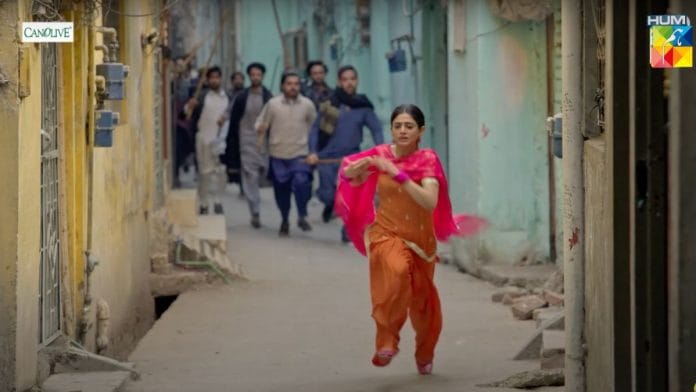New Delhi: A fictional mob lynching incident has captured Pakistan’s attention. It was depicted in the final nine minutes of the Pakistan TV show Tan Man Neel o Neel, which aired last week. The stark portrayal of violence shocked viewers and quickly went viral.
“It was heart-wrenching, but we thought agar tamacha maarna society ke muh pe hai toh strong maaro (we thought that if a slap on society’s face is to be delivered, it should be delivered strongly),” said the show’s director and acclaimed theatre artist Saife Hasan to ThePrint.
The 10-episode drama follows Rabi (Sehar Khan) and Sonu (Shuja Asad), a young couple—a dancer and an event planner—who are falsely accused of blasphemy. The show ends with both characters fleeing from the mob, intercut with real-life instances of mob lynchings, including the case of Mashal Khan, a university student killed over alleged blasphemy, and that of Priyantha Kumara, a Sri Lankan factory manager burnt alive in Islamabad.
In a haunting depiction, the bodies of Rabi and Sonu are never shown. Instead, their scattered belongings—a dupatta lying on the street where Rabi once walked and a jacket tangled in a power line, falling from the rooftop where Sonu practised his dance—speak volumes.
“Those killed by angry mobs are just like us. The people who kill us are often not strangers but people we know—the ones who live next door,” Hasan added.
As the dupatta and jacket fall to the ground, scenes depicting real-life incidents play out, including the burning of the Christian locality Jaranwala, an angry mob surrounding a woman in Lahore because her Arabic calligraphy read “halwah,” and the infamous 2010 lynching of two brothers, Muneeb and Mughees Butt, in Sialkot.
Also read: Pakistani TV is reviving cinema. Kabhi Main Kabhi Tum finale draws sold-out crowd in theatres
The evolution of TV dramas in Pakistan
Pakistani dramas have evolved to address critical social issues that were once ignored. With their compelling storylines and powerful performances, these shows tackle topics such as Afghan refugees, mob violence, corruption, and assault. HUM TV, especially, is known for its socially relevant programming.
Film critic Kamran Jawaid argued that the real issue isn’t the evolving intellect of the audience; underestimating people’s capacity for understanding is a mistake. This is why shows with heavy themes often succeed—the problem lies in how networks perceive such content.
“The dilemma is prevalent across the world, so Pakistan is not an exception. The issue is compounded by the fact that we don’t produce anything but ‘dramas’, unfunny sitcoms, very few laughable horror shows, and fewer (if any) crime thrillers. We’re run by this blind submission to statistics and how one should only cater to women—our primary audience—ergo the utter lack of diversity in genres,” Jawaid added.
However, a slow shift is underway, with some networks experimenting with short series. These formats are more focused and concise, offering a leaner alternative to the bloated nature of longer shows—a key reason they stand out.
Tan Man Neel o Neel is part of a trilogy, following earlier dramas Mann Jogi and Nadaan, which explored themes such as the misuse of Halala and drug addiction.
The viral scenes moved audiences. Discussions ranged from the real-life incidents the show highlighted to the violence inflicted by men, with some even calling it Pakistan’s version of Edward Munch’s The Scream. The verdict is out—it is a masterpiece.
Also read: Pakistani TV drama talks about transgender child. Fashion designer says country sold its soul
The mob that sparked action
It was the Lahore mob incident that spurred HUM TV founder Sultana Siddiqui to take action, prompting her to create shows with relevant social messages.
“We see so much of this in the daily news — women, men, and children killed on the streets, a mob attacking a woman because she is wearing an Arabic design which actually reads ‘halwah,’ and so on. I would discuss this often with people around me, and they would say, ‘Aapa, why don’t you do something about this?’ So, I decided to plunge into the fire!” she told Dawn in 2024.
Vigilante mobs have killed at least 89 people in Pakistan over blasphemy accusations, including four individuals murdered in 2024 alone in Sargodha, Swat, Quetta, and Mirpurkhas.
For Hasan, this is not new. Along with Mustafa Afridi, the writer of the show, Hasan had previously tackled issues such as overpopulation, lack of healthcare, and poor education in rural Pakistan in their highly acclaimed 2024 show Zard Patton Ka Bunn.
What was surprising, however, was the response.
“It went so viral that we are getting calls from literally all over the world. We didn’t think of this,” he revealed.
Afridi, for his part, believes that this “fiction mixed with reality” is necessary. For him, it is his responsibility as a writer; stories should be practical rather than mere escapes from reality.
“There should be something in it that you learn, that you see. It’s not that I want to teach people—I want to tell my story. Whoever wants to take a lesson, they can,” he said.
(Edited by Prashant)







The outrage exists only for fictional lynching.
For real lynchings, the crowd joins the mob – physically, or morally (= cheering for it).
Yes, even your friendly neighbour who wouldn’t harm a fly.